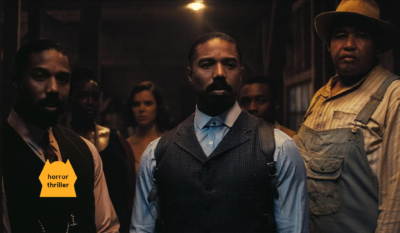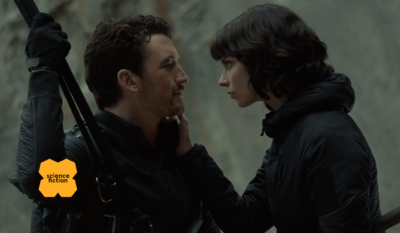ADVERTISEMENT
The Midnight Sky follows a cataclysmic event that leaves a scientist alone in the Artic and a spaceship returning home in the dark


The Midnight Sky combines the story of Interstellar with the action set pieces of Gravity but ends up being less than stellar and unable to leave the ground.

George Clooney's directorial filmography is really as mixed as they come with highs (Good Night, and Good Luck) and lows (The Monuments Men) and then the low lows (Suburbicon). And so it's fitting that his latest film The Midnight Sky—streaming on Netflix on December 23rd—lands very much in the middle. It feels as if it should be a sprawling sci-fi epic. It isn't. It feels as if it should be a meditation on loneliness and regret. It isn't. What it is is a perfectly serviceable two hour mishmash of the science fiction films that came before—mainly Interstellar and Gravity—that were noticeably more successful.
The Midnight Sky follows two storylines. In one, Augustine Lofthouse (George Clooney plays him in the present, Ethan Peck in flashbacks), a scientist who voluntarily stayed behind in the Arctic as the rest of the base evacuates back to their families during a global catastrophe is shocked to find a girl that was left behind (Caoilinn Springall). The pair, struggling to survive, must travel to a distant communications satellite that they are going to use to communicate with the spaceship Aether to warn them not to return to Earth.
ADVERTISEMENT
That spaceship is on its return mission from K-23, a recently discovered moon orbiting Jupiter that is able to sustain human life. Onboard are Sully (Felicity Jones), a bright and cheery communications officer, her partner Tom (David Oyelowo), the commander of the ship, along with the rest of their crew (Kyle Chandler, Damien Bichir, and Tiffany Boone). They are unaware of what has happened on Earth, all they know is that communication has gone dead, which has caused them to drift from course and into uncharted swathes of Space leaving them vulnerable to the unknown.
The two storylines battle for priority in Mark L. Smith's screenplay, which betrays any momentum the film could muster. There are flashes of excitement, particularly a narrow escape from the frigid sea for Clooney's half and a Gravity-like brush with an asteroid field for the Aether, but any of the thrills feel hollow because our investment in the characters and story are left in zero gravity.
ADVERTISEMENT
It's one of the few times I've felt more exposition would have been welcome. We teased with so many interesting tidbits of information—including this cataclysmic event on Earth and the search for a habitable planet, but are left with more questions than answers. Which would be fine if the film had strong character arcs—instead we're left with unearned payoffs.
And then it just ends with a third act twist that would have been more impactful had Augustine been more than just a character we were following. The Midnight Sky shot for the… well, sky, but missed in almost every one of its ambitions. A more focused-film and tighter screenplay might have helped this movie take off. Instead, it's left grounded.
ADVERTISEMENT
More movies, less problems
- Jordan Peele Unleashes the First Trailer for ‘HIM'
- ‘Sinners' is the best movie of the year | movie review
- Romantic sci-fi thriller ‘The Gorge' hits its mark | movie reivew
Hey! I'm Karl. You can find me on Twitter and Letterboxd. I'm also a Tomatometer-approved critic.
💌 Sign up for our weekly email newsletter with movie recommendations available to stream.
ADVERTISEMENT
💌 Sign up for our weekly email newsletter with movie recommendations available to stream.
ADVERTISEMENT
Hey, I'm Karl, founder and film critic at Smash Cut. I started Smash Cut in 2014 to share my love of movies and give a perspective I haven't yet seen represented. I'm also an editor at The New York Times, a Rotten Tomatoes-approved critic, and a member of the Online Film Critics Society.

